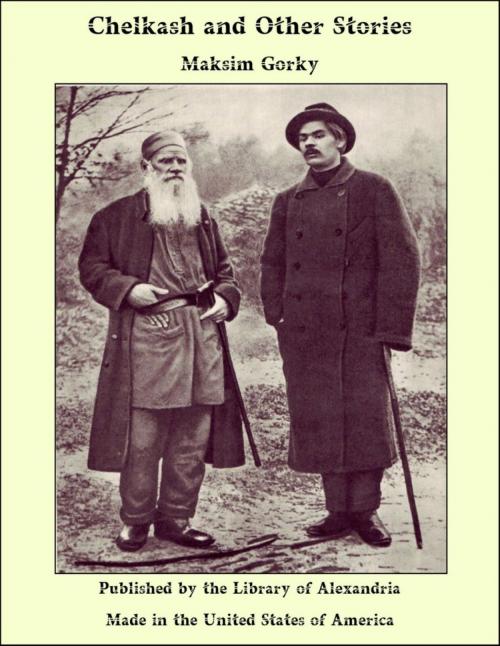Chelkash and Other Stories
Nonfiction, Religion & Spirituality, New Age, History, Fiction & Literature| Author: | Maksim Gorky | ISBN: | 9781465600226 |
| Publisher: | Library of Alexandria | Publication: | March 8, 2015 |
| Imprint: | Language: | English |
| Author: | Maksim Gorky |
| ISBN: | 9781465600226 |
| Publisher: | Library of Alexandria |
| Publication: | March 8, 2015 |
| Imprint: | |
| Language: | English |
This happened in 1892, a famine year, at a point between Sukhum and Ochemchiry, on the shore of the Kodor River, so near the sea that through the gay babble of the clear waters of the mountain stream the muffled thunder of the billows was distinctly heard. It was an autumn day. Yellow cherry-laurel leaves were circling and glistening in the white foam of the Kodor like nimble salmon fry. I was sitting on some rocks near the bank and reflecting that the sea-gulls and cormorants, too, must be mistaking the leaves for fish, and that was why their cries were so fretful over there to the right, behind the trees where the sea was rumbling. The chestnut trees overhead were decked out in gold; at my feet lay piles of leaves which looked like the palms of hands that had been cut off. On the opposite bank the hornbeam boughs were already bare, and hung in the air like a torn net; caught in it, as it were, a red and yellow mountain woodpecker hopped along, tapping the bark with his black beak, while adroit titmice and dove-colored nuthatches—visitors from the distant north—pecked the insects he drove out. To the left, above the mountain peaks, hung smoky, heavy, rain-laden clouds; they cast shadows over the green slopes dotted with boxwood, Òthe dead tree.” Here in the hollows of old beeches and lindens is found that Òheady honey,” the intoxicating sweetness of which nearly caused the downfall of the soldiers of Pompey the Great long ago, having overcome a whole legion of iron Romans. The bees make it from laurel and azalea blossoms, and tramps get it out of the hollows and eat it, spreading it on what the natives called lavash, a thin flat cake made of wheat flour. That is exactly what I was doing, as I sat under the chestnut trees. Stung all over by angry bees, I was dipping pieces of bread into a kettle full of honey and eating, while I admired the lazy play of the weary autumnal sun.
This happened in 1892, a famine year, at a point between Sukhum and Ochemchiry, on the shore of the Kodor River, so near the sea that through the gay babble of the clear waters of the mountain stream the muffled thunder of the billows was distinctly heard. It was an autumn day. Yellow cherry-laurel leaves were circling and glistening in the white foam of the Kodor like nimble salmon fry. I was sitting on some rocks near the bank and reflecting that the sea-gulls and cormorants, too, must be mistaking the leaves for fish, and that was why their cries were so fretful over there to the right, behind the trees where the sea was rumbling. The chestnut trees overhead were decked out in gold; at my feet lay piles of leaves which looked like the palms of hands that had been cut off. On the opposite bank the hornbeam boughs were already bare, and hung in the air like a torn net; caught in it, as it were, a red and yellow mountain woodpecker hopped along, tapping the bark with his black beak, while adroit titmice and dove-colored nuthatches—visitors from the distant north—pecked the insects he drove out. To the left, above the mountain peaks, hung smoky, heavy, rain-laden clouds; they cast shadows over the green slopes dotted with boxwood, Òthe dead tree.” Here in the hollows of old beeches and lindens is found that Òheady honey,” the intoxicating sweetness of which nearly caused the downfall of the soldiers of Pompey the Great long ago, having overcome a whole legion of iron Romans. The bees make it from laurel and azalea blossoms, and tramps get it out of the hollows and eat it, spreading it on what the natives called lavash, a thin flat cake made of wheat flour. That is exactly what I was doing, as I sat under the chestnut trees. Stung all over by angry bees, I was dipping pieces of bread into a kettle full of honey and eating, while I admired the lazy play of the weary autumnal sun.















